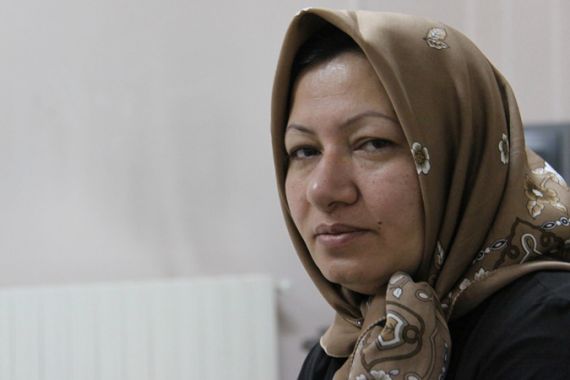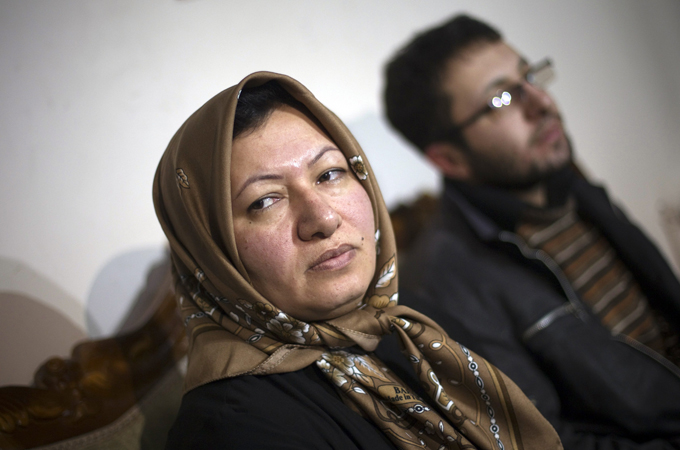Iran stoning ruling ‘could change’
Justice department official says death sentence may be commuted, while convict says she may “sue” journalists.

 |
| Ashtiani was first sentenced to hang for her husband’s murder and later to be stoned to death for adultery [Reuters] |
Authorities reviewing a death by stoning sentence against an Iranian woman convicted of adultery could still commute the sentence, a senior Iranian judiciary official has said.
Sakineh Mohammadi Ashtiani was taken from prison late on Saturday to meet journalists to talk about her confession of helping her lover kill her husband. Ashtiani, who has previously appeared on state television, denied that she had been tortured in prison and admitted that she was an accomplice to the murder.
Security officials accompanied her at the news conference.
Ashtiani also said she planned to sue the two German journalists who helped to ignite international furore over the case. The two journalists were arrested by Iranian authorities after trying to meet with Ashtiani’s son to interview him.
The Fars news agency quoted on Sunday Malek Ajdar Sharifi, the head of the justice department in East Azerbaijan province, where Ashtiani is jailed, as saying her case remains under review and that “everything is possible”, regarding a possible commutation of the sentence.
Sharifi said there are “some ambiguities on evidence” in the case. Ashtiani’s son appealed on Saturday to Iranian authorities to commute his mother’s sentence.
“I have said that I do not think that my mother is innocent. She is certainly guilty,” Sajjad Qaderzadeh said.
“However, the decision has to be made by our country’s officials. They may change the stoning sentence to some other verdict.”
Plea for compassion
Speaking from Tabriz, in northwestern Iran, Qaderzadeh told foreign media his mother had violated Islamic law, but called for compassion and forgiveness.
Ashtiani was allowed out on prison leave to have dinner with her daughter and son on Saturday, hours after he had appealed to the judiciary to spare her life.
Journalists were allowed to meet her briefly the same day, when she again confessed to being an accomplice in the murder of her husband, while maintaining that it was her lover who did the actual killing.
“In my opinion my mother is also guilty but since we have lost our father we do not want to lose our mother too. Consequently, we ask for a commutation of the penalty,” Qaderzadeh said.
Qaderzadeh was arrested in October after he discussed his mother’s case with two German journalists, who were taken into custody for having entered the country on tourist visas but working as journalists.
He was freed on a $40,000 bail on December 12, but the journalists remain in custody.
Ashtiani further said that she advised her son to sue the German journalists, who “embarrassed” her.
“I want my voice to be heard. I want to complain about the German reporters who made this case even more complicated and worsened my situation,” Ashtiani said.
She also denied ever having been tortured during her time in prison, as had been alleged by her former lawyer.
Ashtiani has been sentenced to death twice. The first court decision to hang her for the murder of her husband was commuted to a 10-year jail sentence by an appeals court in 2007.
She was later condemned to die by stoning for adultery, a sentence which was upheld by another appeals court.
Possible execution
In the face of international outrage the sentence was suspended and is under review by Iran’s supreme court, but she still faces possible execution.
It was not immediately clear when Ashtiani would return to prison.
“The stoning sentence is on the file but it may not be carried out. At least this is what we are hoping,” Qaderzadeh said.
Ghanbar Naderi, an analyst on Iran, told Al Jazeera that the sentence was never going to stand up to scrutiny.
“Stoning has been abolished for a couple of decades now. The judge obviously he didn’t have an idea of the judiciary process in this country. We have a just and fair justice system.
“The judge was not fit for the job and he made the unnecessary mistake of giving the stoning sentence to this woman.
“But let’s not forget that she is still complicit in her husband’s murder, and she still has to spend time behind bars, a couple of years. But she is not supposed to be hanged for death because she is complicit.
“The person who has to face justice is the man who carried out the actual murder.
“Iran is being flexible … This is not the first time and it is not the last time. We are a member of the international community and we will make sure that we abide by international law and that is what we have been doing.”
Stoning was widely imposed in the years following the 1979 Islamic revolution, and even though Iran’s judiciary still regularly hands down such sentences, they are often converted to other punishments.
The last known stoning was carried out in 2007, although the government rarely confirms that such punishments have been meted out.
Under Islamic rulings, an adulterer is usually buried up to his waist, while an adulteress is buried up to her chest with her hands also buried.
Those carrying out the verdict then throw stones until the condemned dies.